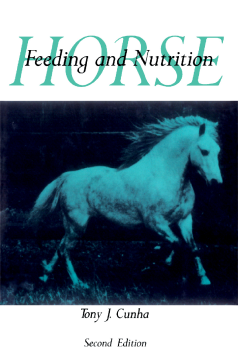
Additional Information
Book Details
Abstract
This is the second edition of Horse Feeding and Nutrition which was originally published in 1980. It provides the latest information available for those interested in the feeding and nutrition of horses. This new edition has been entirely revised to include the large amount of new research information that has become available since publication of the first edition. Three new chapters have been added, entitled Feeding and Health-Related Problems, The Complexity of Proper Bone Formation, and Exercise Physiology. New feed and food crops, improved methods of production and processing, increased productivity of animals and crops, changes in animal products including more lean and less fat in meat and less fat in milk, longer shelf-life requirements of animal food products, and a myriad of new technological developments have resulted in a need to continually re-evaluate nutrient requirements and supplementation.
Sample diets are given, useful as guides in developing diets for horses. Suggested levels of protein, minerals, and vitamins for use in horse diets are presented. These can be used as guides which can be modified to suit the various feeding situations encountered in horse farms.
The volume of scientific literature is increasing rapidly each year. Moreover, its interpretation is becoming more complex. This increases the need for summarizing and interpreting these new developments in up-to-date books such as in this one.
- Sample diets-useful as guides in developing diets for horses
- Suggested levels of protein, minerals, and vitamins for use in horse diets
- These can be used as guides which can be modified to suit the various feeding situations encountered in horse farms
"Entirely revised (first edition, 1980) to reflect new feed and food crops, improved methods of production and processing, increased productivity of animals and crops, changes in animal products including more lean and less fat in meat and less fat in milk, longer shelf-life requirements of animal food products, and new technological developments. Sample diets are given, as well as suggested levels of protein, minerals, and vitamins, which can be modified to suit various feeding situations." --SCI-TECH BOOK NEWS
